A reader sent this question in regarding Super Metroid, which included an optional “Japanese text” mode in the English game:
On a whim (and after reading your site), I turned on “Japanese text” mode for the first time, expecting it to replace everything with Japanese localization. I was surprised when I found literally all of the UI and gameplay text was still in English, with a little (but not all) of the story and announcement text subtitled in Japanese. If I didn’t know better, I would have guessed Super Metroid was developed by an American team, then hastily given a Japanese once-over.
Were there any other games of the time given this sort of treatment?
I was actually pleasantly surprised when I first realized that Super Metroid had a Japanese text option. I had just started to get into studying Japanese, but with so little Japanese stuff available where I lived I took whatever scraps I could find. As a result, the Japanese word for “Metroid” was probably among the first few dozen Japanese words I learned.
Anyway, to briefly recap, Super Metroid has an English language option and a Japanese language option:
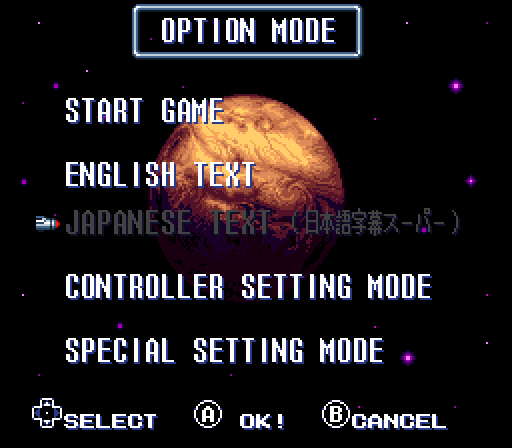 |
I’m not 100% sure since I don’t have my Japanese copy anymore, but I was under the impression that the Japanese version of Super Metroid is THE exact same as the English version, with every single bit and byte the exact same in both versions. If so, this was probably done to save on manufacturing costs, and because there’s so little text in the game to begin with, having a text option in both versions wasn’t a hassle. I might be wrong, though, so if I am please let me know.
So, when you select the Japanese text option, you’d think the game would change all the text and audio into Japanese… but it doesn’t. Instead, it adds Japanese subtitles to the bottom of the screen whenever special English text appears on the screen. Here are some examples from the intro story:
 | 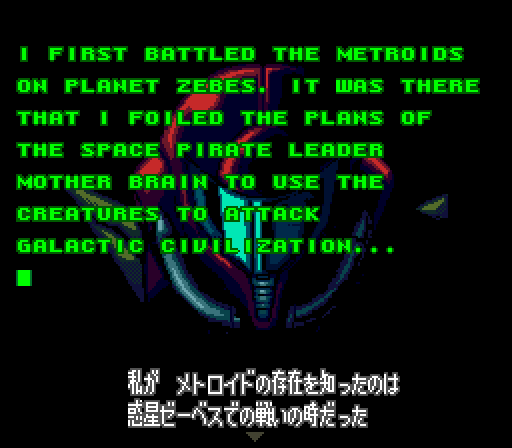 |
Even the present-day stuff gets this treatment, including text that appears while you play:
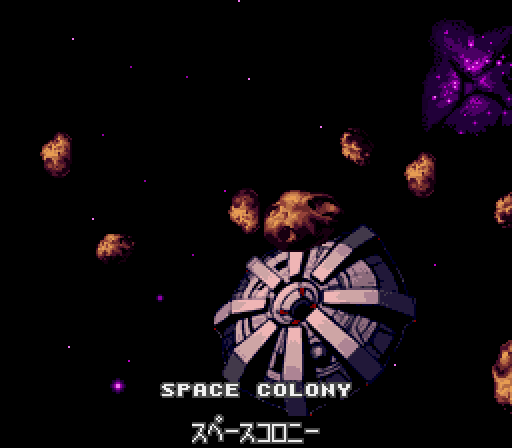 |  |
It looks like the only time Japanese text fully replaces English text is in the config menus:
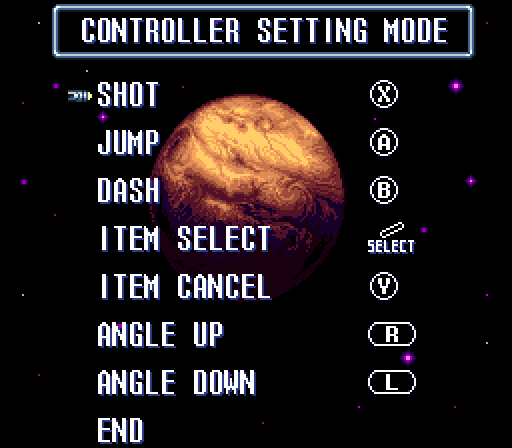 | 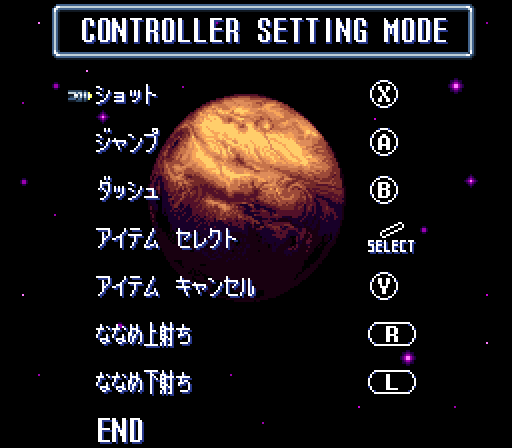 |
The equipment menu and all that remains in English regardless of the language setting, as we’ve seen before.
So, in all, the Japanese text option is basically the exact same as the English option but with Japanese subtitles added to the bottom. From a Japanese player’s standpoint this actually gives it a really cool, cinematic vibe, like you’re playing/watching a Hollywood sci-fi movie or something. It’s pretty neat. And the English text compared with the simplified Japanese text does make me wonder if big parts of it were developed or written outside of Japan.
Anyway, the question is, “Are there any other games from this time that do this sort of thing too?”
Off the top of my head, I can’t really think of any. The very first thing that came to mind was Super Punch-Out and its secret name registration screen – if you hold X and A when you start a new game, you can enter your name in Japanese instead of just English. And since it was a Nintendo-made game from the same time, this dual-language thing probably wasn’t a coincidence. But this trick doesn’t change the game’s language or add subtitles or anything, so it’s not quite the same.
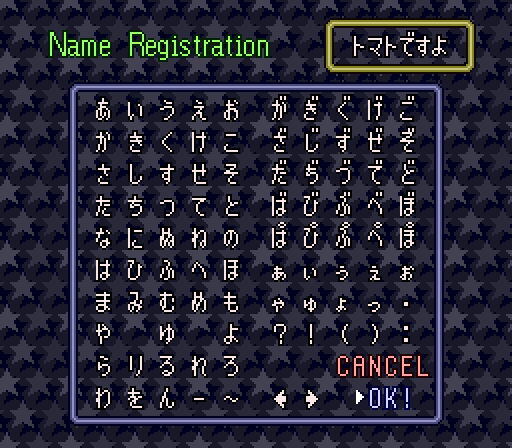 |
So it’s time to open this question up to everyone. Do you know of any Japanese games that are basically entirely in English but have a Japanese option that still keeps everything mostly in English? There’s gotta be some more out there, so I’m really curious to know!


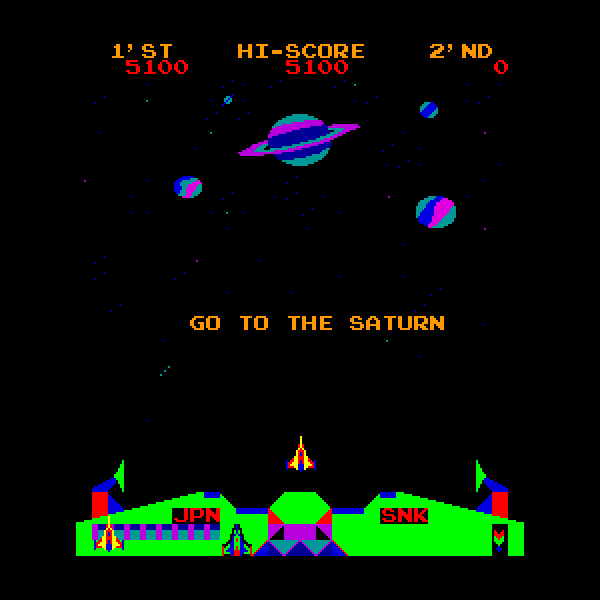

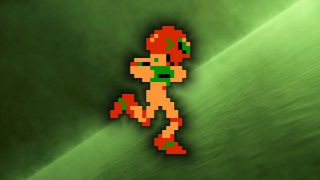

Funny you should mention Super Punch-Out!! in this context, as I’m fairly certain it never even got a Japanese release outside of the Nintendo Power cartridges.
Wow, that’s interesting. It was one of my favorite games, but now that I look back I don’t really recall seeing it in Japanese game shops.
Fight Night Round 2’s Gamecube version had Super Punch-Out as a bonus game within a game. It even had a Japanese release: http://www.amazon.co.jp/gp/product/B000AMCV5U/ref=pd_lpo_sbs_dp_ss_2?pf_rd_p=466449256&pf_rd_s=lpo-top-stripe&pf_rd_t=201&pf_rd_i=B000A6CIJ0&pf_rd_m=AN1VRQENFRJN5&pf_rd_r=1BDQ7E02WG6VFVA6XB3R
So, yeah, only common way to get a physical release of Super Punch Out in Japan is to buy that boxing game. It did recently have a Wii U release, though…
The entire game isn’t in English like this, but Rockman X does similar subtitles under English during Dr. Light’s warning in the intro.
Not exactly the same I think, but I remember reading that the Japanese version of the SNES shadowrun keeps all the dialogue the same but adds Japanese subtitles and an extended intro for whatever reason.
I believe the Silent Hill games have only English voices with your choice of English or Japanese (or FIGS?) subtitles–presumably because the games take place in the States and the characters would naturally be speaking English. I don’t remember what happens in the menus, though.
Same with Resident Evil
In the EU versions of Super Metroid, I think all other languages subtitle the English like this as well. I’m not sure though, been a while since I checked.
It does. Similar to the Japanese Super Metroid subtitles, the French and German subtitles are also shortened/abbreviated paraphrasing, rather than full sentence-for-sentence translations.
Since the Metroid series was done as a bit of an homage to the Aliens movies… any thought that maybe since they probably saw the movies originally as English movies with Japanese subtitles, they wanted the same experience in the game for the Japanese market?
It’s probably unlikely, but I just kind of wonder.
That was actually the same vibe I was getting when watching the Super Metroid intro in Japanese earlier today. I dunno if it was meant to be like Aliens or just movie-like but I immediately thought of Aliens too.
The way bosses are introduced in the 3D Zeldas also reminded me a lot of Japanese subs of American movies too, but I need to get my hands on some Japanese Star Wars tapes to explain it well. Maybe for a future update!
Are you talking about the “Character (Dub Actor)” subtitles used in Japanese versions of Hollywood movies? Apparently they’re what inspired Metal Gear Solid’s “Character (Voice Actor)” subtitles.
in fact, japanese voice acting of mgs1 is inspired by japanese dub of hollywood movies according to the official website of integral
https://www.konami.com/mg/archive/integral/whats/mgsi2.html
I hadn’t thought about the cinematic angle.
When I first saw the option, I remembered a Nintendo Power preview saying the game was developed primarily for western audiences because Metroid’s not that big a deal in Japan, and assumed they did it that way so they wouldn’t have to make a separate ROM for the few sales they’d get in Japan.
Not in the case of Zelda but that’s definitely another thing I noticed after watching lots of Japanese movies.
With Zelda, the way it introduces bosses with their names + a little tidbit of info is sometimes done with movies, like I remember watching the Japanese version of Empire Strikes Back and whenever there’d be a new robot or character it’d give the thing’s name + info the first time you see it. Even if it wasn’t important, like the little search droid that scans the snowy area at the start of the movie. I think it’s just a Japanese convention in general but seeing it applied to games and foreign movies is so strange.
I personally imagine that it’s born out of a common way they handle foreign terms in general, especially in light novels although I’ve seen it a lot in fantasy/sci fi games as well. Which is to say the kanji describing it and then the pronunciation as the furigana. Reversed I imagine to make the proper noun clear, but since it’d just be a random foreign word splashed on screen, the description is required to explain what it’s referring to. And it kind of just spread stylistically from there.
In Star Wars case, it is a very effective way of also transferring information that isn’t translated very obviously. R2D2’s name, for example, is obviously distinctly strange in English, but that doesn’t translate directly in itself to Japanese.
I think what you’re talking about harkens back to action anime: When the monster of the week was first shown, they’d usually show its name onscreen, possibly with a title or descriptor attached. This dates at least to the early 70s, if not earlier.
Funnily enough I was just playing around with the Japanese text option today.
One interesting thing is that the backstepping was “localised” as “moonwalk” in the special settings
It wasn’t called “moonwalk” in the English? That’s definitely what we all called it. My SNES isn’t hooked up, but I just checked the Wii U VC version, and it totally says “moon walk.” Or is that what you mean — that it’s “moon walk” in the English but not in the Japanese? That sort of makes sense; was Michael Jackson a big deal in Japan? I don’t have any idea.
Oh, fool is saying that it’s “Moon Walk” in the English version but it’s “backward slide-shoot” or something like that in Japanese.
Michael Jackson is HUGE in Japan, incidentally. Even impersonators are well-received there, from what I hear 😯
Huh, interesting. Now to complete the circle: what was Michael Jackson’s Moonwalk dance (and film, and game, and…) called in Japanese? Did they still call it Moonwalk? Or was it… backward slide-shoot? 😉
It looks like the dance and film are still called Moonwalk/Moonwalker, written in katakana. I’m guessing for the English version of Super Metroid they needed to fit a term in such little space that they got creative and decided on Moon Walk.
That would certainly explain that video of Weird Al doing his Jackson parody on a Japanese tv show where people in giant lobster suits danced around him. I can’t find the video at the moment (he used to have it on his own youtube channel), but in it, the man looked very confused. Leave it to the Japanese to out-weird Weird Al.
Impersonators in blackface?
I’m not really sure, but I wouldn’t be surprised if that were the case.
Yes, Naoto Ohshima (Sonic original designer) said Sonic shoes was based of the shoes MJ uses in the “Bad” videoclip.
In the PAL version of Super Metroid, these two options are replaced with “French subtitles” and “German subtitles”. And you HAVE to pick one! There’s no “English only” option, and certainly no Japanese option! This was kept the exact same for the Wii U release, and some people on Miiverse were commenting about it of course.
And as for something about Japanese options in localised games: I know that in Sonic Adventure for GameCube, you can name your Chao in the Chao Garden using kana if you wanted. Sonic Advance for the GBA had English and Japanese options in all versions
In fact, I think the ONLY difference between the USA and JPN versions of Sonic Advance is which of the two languages the cursor defaults to at the beginning.
Interestingly, the EUR version has other language options available, but the options menu, title screen and zone names are only changed to something different when selecting Japanese. The German, French and Spanish options seem only to affect the language your Chao will speak in the Chao garden.
Also interesting in Sonic Advance is that there’s always Kana used in the title cards for the stages and the title screen, even when set to English.
That’s right about EUR Super Metroid. Nintendo had not one but two chances to fix this failure but didn’t, and same goes for many PAL releases they botched. Being an European gamer sucks.
More on topic, the incoming Pokémon XY lets worldwide players choose from Japanese, Korean, English, French, German, Italian and Spanish. I’m picking Japanese for practice, and because our local translation is lame :p.
Whoa, that’s awesome! I wish I had such big language options when I was a kid and learning the language…
yeah, ever since the Dreamcast, the majority of Sonic games have been EXACTLY the same worldwide, sporting both a Japanese and English audio option and a multilingual text option (the latter of which also supports various European languages along with the two voiced languages). In Sonic Adventure DX, you can even play both the English and Japanese versions of the Game Gear games depending on the text you have set (though admittedly, this doesn’t do too much; I think the only game to have a considerable amount of in-game text is Tails’ Adventure, and a couple games use different titles and thus drastically different title screens between regions, like “Sonic Triple Trouble” being “Sonic & Tails 2” in Japan).
I swear when I was a kid I rented the game a few times from Blockbuster with Spanish replacing the Japanese option (localization including the in-game text), but cannot find any record of it ever being released. I even emailed Nintendo a few years ago and they just said their current database doesn’t have any record of release languages.
Probably not exactly the same thing, but the Japanese DS rereleases of the Gyakuten Saiban/Ace Attorney games contained the entire English script, which you could change to at the title screen. This made them great import titles.
Weren’t they also early, less localized translations of the Japanese text? I seem to remember reading they were, and if that’s the case, it makes them even more interesting, since you can see the revisions the script went through, like a prototype.
The only one I have experience with is Gyakuten Saiban 2 (which I imported because I was impatient), and my initial reaction with the script was that it needed a lot more editing time – there’s lots of grammatical and punctuation errors, especially in (going by my memory alone here) the third case, the one with the Big Berry Circus.
Cut to two months later and a friend of mine picked up the American version, only to find the script was … pretty much unchanged, as far as we can tell. GS2’s kinda-crappy script made it Stateside.
I can’t believe no one’s mentioned it, but Treasure’s Sin and Punishment is all about this. Despite having been released only in Japan, it has English voice acting with Japanese subtitles. Playing it you can tell it was supposed to be like a foreign movie to Japanese audiences. It was also a very common import title because of it’s accessibility. For me, it was this really cool thing during my very early period of studying Japanese.
Is the English voice acting good? I remember a few times in subtitled anime where they have characters who are speaking English, and sometimes it sounds pretty terrible.
I have a Japanese Super Metroid cartridge, and as far as I can tell it is indistinguishable from the North American version.
The Japanese release of Super Metroid is indeed exactly the same as the American release. You can see they’re the same entry in, e.g. the No-Intro database: .
That was supposed to be http://datomatic.no-intro.org/?page=show_record&s=49&n=2773
http://www.hardcoregaming101.net/shadowrun/shadowrunj-1.png
Yup, Shadowrun is pretty much the same. 🙂
I was just about to mention that! 😮
It’s funny, too, since Shadowrun’s setting is kind of a relic from back when everyone though Japan was going to take over the world. XD It’s pretty neat to see an honest-to-God kitsune in a western game, though, especially one from back then.
I know of three more games–well, one of them is a sequel–that have English-language voice acting despite being made in Japan. No More Heroes and its sequel are supposed to take place in a fictional SoCal town called “Santa Destroy,” and as a result, they’re entirely in English. The Japanese version just has subtitles. (Although I think the 360 rerelease of the game might have added in Japanese voice acting? Hmm…) Similarly, Deadly Premonition (called Red Seeds Profile in Japan) takes place in a fictional Washingtonian town (and was also heavily influenced by early 90’s TV show Twin Peaks) so all the voice acting is in English. Although the game’s script was clearly written in Japanese first, since there’s a lot of odd lines in it that were clearly translated weirdly!
though, unless the text options are the same between regions, the games aren’t “exactly” the same between regions, as Mato was talking about. This honestly kind of intrigues me; when it comes to audio, you’ve got several Japanese games that used English acting to begin with, you’ve got several English localizations that keep Japanese acting, and in some cases, you even have both regions having options for each respective language with the only real change being the default setting. When it comes to text, however, it’s usually just limited to the language of whatever region it’s being released in, and I recall there being cases where even a simultaneous global release managed to fail that.
I also feel I should bring up Square-Enix, which seems to have developed an odd habit of REMOVING language options that were already in the Japanese release, so now a game with Japanese and English becomes a purely English game. They’ve done this with Chrono Trigger DS and, I think, Kingdom Hearts HD (though to be fair, I imported Chrono Trigger DS, and the bilingual feature isn’t all that great; while the English script is there, it seems they didn’t compensate for the character-naming options, so you’ll have Japanese names showing up in English script regardless of whether you chose the characters’ default names or not).
Shadow of Destiny/Shadow of Memories is another such game. It’s a 2001 PS2 game from Konami. I played the American version first, then bought the Japanese version because I was curious to hear what they sounded like in the Japanese version… only to find that they were the same. Putting the Game in Japanese mostly only affects the subtitles!
Though it’s not a Japanese text “option”, the game I immediately remember for having Japanese text was Mario Paint. There wasn’t much in-game text, but there were stamps for writing in both Japanese and English even in the American version. I guess they didn’t see the need to make different versions of the game for the different regions when the only Japanese text was the stamps. But the really amazing thing about it was that in the instruction manual they had actually explained that these were Japanese letters, and explained how to read hiragana, katakana, and a few basic kanji. As a kid, this was so amazing to me, and was my first step in learning Japanese!
A shot of the pages:
http://puu.sh/6MVH6.jpg
Yeah! I first started teaching myself katakana from a book I bought on a vacation to San Francisco, “decoding” everything to English sounds/letters kana by kana, and I’d completely forgotten about it, but I stumbled across those pages of the Mario Paint manual once I returned home and wound up using it to check my re-transliterations for accuracy. Man! Things I haven’t thought about in years.
If you forces the emulator to Japan, Sonic 3 changes Tails’ name to “Miles” =)
Late post, but this seems not all that uncommon in games. Alien Soldier and Ninja Warriors Again off the top of my head are two games like this. Also you have games like Einhander and Biohazard that prefer to use foreign voice overs with Japanese subtitles rather than Japanese voice overs. My feeling? I feel that the foreign text is used to give the game a more western/futuristic feel… the same way games set in old Japan use a lot of archaic Japanese. Its actually a pretty cool touch I feel!
Another game that has a completely Japanese option is Astro Boy – Omega Factor. Intresting, actually, because when the game was released in NA and EU, it was balanced up. I haven’t checked if the game gets “debalanced” when you choose the Japanese option, but once when I tried it, I accidentally pressed the “Delete All Data” button – wiping my almost-complete save.
The “cinematic” presentation of the game text in Japanese makes me appreciate the Japanese commercial for Super Metroid even more. It’s a live action reenactment of the backstory to the game, in the same vein as the Alien movies that inspired Metroid. You can really tell they were going for a movie-like experience with this game, something that was mostly lost on foreign players!
https://www.youtube.com/watch?v=KWdJBIo3yk4
Wario Land 3 on Game Boy Color works similar to Super Metroid. The game let you choose the language at the beginning in both US and Japanese copy, although you can’t change the language afterwards unless you delete your save data.
The only places the language setting matters are the dialogues of that large statue guy and the level names. The “Now Saving” screen shows both language regardless of the setting. Everything else, like the pause screen, remain in English.
There was a Transformers PS2 game made by Atlus that was only released in Japan. All of the dialog was in English, though, and the language options only added subtitles and changed on-screen text. Unfortunately, they did not use the original voice actors from the cartoon, the actors they did hire weren’t very good actors, and the game itself wasn’t very good, either.
http://tfwiki.net/wiki/The_Transformers_(PS2)
Tetris Attack has a Japanese option too
Way late to the party, but the Japanese remakes of the Wizardry games include the entire English script from the original PC games. This makes them great imports, as with a little bit of fiddling with menus you can play Wizardry 1 through 5 with updated graphics, and the convenience of auto mapping.
Actually, Super Monaco GP on the Genesis/Megadrive also have a Japanese option for the World Championship mode.
I was blown away when I first saw the Japanese version of F-Zero GX, which actually had English voice acting and just subtitles. Seems like a similar case?
Some of the cinematics also had English text in various places (such as the newspaper cover in Blood Falcon’s movie), would be interesting to find out if those were localized or not.
The “cinema fonts” seen on Kingdom Hearts and such are also meant to invoke the feel of japanese subtitled movies